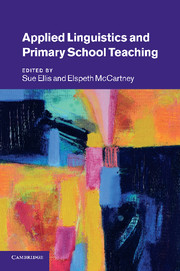Book contents
- Frontmatter
- Contents
- List of figures
- List of tables
- Notes on contributors
- Preface
- Editors' notes and conventions
- Introduction
- Part I Policy and diversity in the twenty-first-century primary school
- Part II The range and focus of applied linguistics research
- Introduction to Part II
- 6 Grammar for designers: how grammar supports the development of writing
- 7 The use of corpus-based approaches in children's knowledge about language
- 8 Words and pictures: towards a linguistic understanding of picture books and reading pedagogy
- 9 From storytellers to narrators: how can the history of reading help with understanding reading comprehension?
- 10 Talk about text: the discursive construction of what it means to be a reader
- 11 Why we need to know about more than phonics to teach English literacy
- 12 Understanding children's reading comprehension difficulties
- 13 Classroom discourse: the promise and complexity of dialogic practice
- 14 Pedagogy and bilingual pupils in primary schools: certainties from applied linguistics
- Part III Empowering teachers and teachers' use of knowledge
- References
- Index
10 - Talk about text: the discursive construction of what it means to be a reader
Published online by Cambridge University Press: 26 April 2011
- Frontmatter
- Contents
- List of figures
- List of tables
- Notes on contributors
- Preface
- Editors' notes and conventions
- Introduction
- Part I Policy and diversity in the twenty-first-century primary school
- Part II The range and focus of applied linguistics research
- Introduction to Part II
- 6 Grammar for designers: how grammar supports the development of writing
- 7 The use of corpus-based approaches in children's knowledge about language
- 8 Words and pictures: towards a linguistic understanding of picture books and reading pedagogy
- 9 From storytellers to narrators: how can the history of reading help with understanding reading comprehension?
- 10 Talk about text: the discursive construction of what it means to be a reader
- 11 Why we need to know about more than phonics to teach English literacy
- 12 Understanding children's reading comprehension difficulties
- 13 Classroom discourse: the promise and complexity of dialogic practice
- 14 Pedagogy and bilingual pupils in primary schools: certainties from applied linguistics
- Part III Empowering teachers and teachers' use of knowledge
- References
- Index
Summary
By focusing on the literacy event, this chapter will use perspectives which combine linguistics with ethnography to explore how children talk about texts in both formal and informal social settings. What might analysis of such talk contribute to teachers' understanding of the literacy curriculum and its role in fostering children's development as readers?
Introduction
In a discussion paper outlining the distinctive characteristics of linguistic ethnography Rampton and colleagues define what sets it apart from other research traditions that are concerned with studying language in context, such as applied linguistics and sociolinguistics, in these terms: ‘linguistic ethnography generally holds that to a considerable degree, language and the social world are mutually shaping, and that close analysis of situated language use can provide both fundamental and distinctive insights into the mechanisms and dynamics of social and cultural production in everyday activity’ (Rampton et al. 2004).
If applied linguistics and sociolinguistics give primacy to understanding the role of language in specific contexts, linguistic ethnographers explore the ways in which an ensemble of linguistic, material and cultural resources shape social interaction. Linguistic ethnography is very much attuned to the way in which the social world in its many facets is continuously remade in particular encounters which are both shaped by the past but also have the potential to transform how things stand. Change and continuities are equally important with an accent on individual agency, tempered by an understanding of the social history which structures how any social interaction takes place and the resources which constrain as well as enable the choices individuals can make.
- Type
- Chapter
- Information
- Applied Linguistics and Primary School Teaching , pp. 127 - 139Publisher: Cambridge University PressPrint publication year: 2011
- 3
- Cited by



